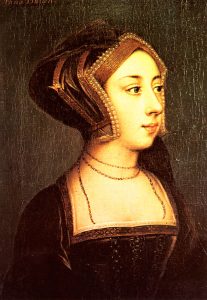 On this day in history, 12th April 1533, Henry VIII’s second wife, Anne Boleyn, made her first public appearance as the king’s official queen consort. They had married secretly on 25th January 1533 and Anne was pregnant, but it was only on 11th April, when the king was sure that the annulment of his first marriage was soon to be sorted out, that Henry VIII ordered his council to recognise Anne as queen.
On this day in history, 12th April 1533, Henry VIII’s second wife, Anne Boleyn, made her first public appearance as the king’s official queen consort. They had married secretly on 25th January 1533 and Anne was pregnant, but it was only on 11th April, when the king was sure that the annulment of his first marriage was soon to be sorted out, that Henry VIII ordered his council to recognise Anne as queen.
For her first public appearance as queen, Anne chose to attend Holy Saturday mass in the Queen’s closet at Greenwich Palace. According to Eustace Chapuys, the imperial ambassador, she had was accompanied by “60 young ladies” and was “loaded with jewels, clothed in a robe of cloth of gold friese”.